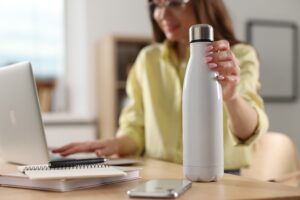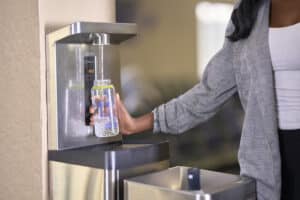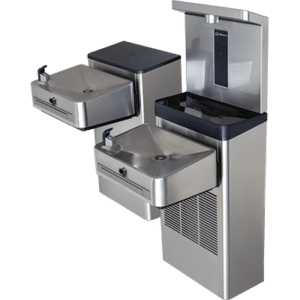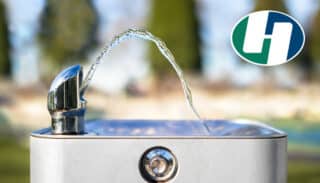Microplastics in Plastic Bottles
Less than a month into the New Year, researchers at Columbia University and Rutgers University issued findings on the distressing micro and nano-plastics found in plastic water bottles. The study revealed a staggering average of 240,000 microplastics in everyday liters of water. Researchers took five separate samples looking at three popular bottled water brands. Although the sampled brands remain anonymous, the microplastic levels ran between 110,000 and 400,000 per liter.
What does this mean for human health? Currently, research on the effects of micro and nano-plastics on human health is minimal. However, researchers do know some things to be true. Once certain microplastics leak into an environment, they will likely stay forever. The human gut accumulates much of the micro and nano-plastics ingested. Researchers attribute this to the minuscule size of specific plastic particles. Some variations present in bottled water are less than a micrometer (a millionth of a meter).
Recent studies have proven that the time and intensity of microplastic exposure impact the effects. Many studies consider drinking water the most pervasive issue of long-term exposure to plastic particles. These analyses found adverse effects on mouse models, saying “long-term inflammation of particles in liver tissues and chronic inflammation could lead to liver disease and chronic pulmonary disorders” (Gambino et al.).
Despite minimal research on the human effects, Duke University professor of medicine and comparative oncology director Jason Somarelli found more than 100 known cancer-causing chemicals in bottled water plastics in work yet to be published.

Reusable Water Bottles Have Become the New Norm
Not only can reusable water bottles reduce the time and intensity of microplastic exposure, but they also improve the global carbon footprint. A study conducted by Oceana estimates that only a 10% increase in market share for soft drink beverages sold in refillable bottles could reduce marine plastic pollution by 22%. This reduction would help prevent tap water microplastic contamination, ultimately mitigating climate change.
Individuals can also make a tangible impact by substituting plastic water bottles with refillable ones. According to a report published by Plastic Oceans, plastic bottles make up 14% of littered waste. When one person switches to a reusable bottle, they would have prevented approximately 170 plastic bottles from being improperly discarded in just one year.
The cost effectiveness of reusable water bottles is often overlooked. A paper produced by The Earth Policy Institute explains that bottled water costs more than gasoline at $10 per gallon. Comparatively, the average cost of tap water is about $0.002 per gallon. For manufacturers, this means lower production costs.
 Filtered Bottle Filling Stations Facilitate Good Environmental and Human Health
Filtered Bottle Filling Stations Facilitate Good Environmental and Human Health
A popular alternative on the rise are filtered bottle-filling stations like the Hydration Station Bottle Filler and Drinking Fountain. These stations compliment reusable water bottle use by encouraging people to refill their water throughout the day.
While the initial installment of hydration stations may seem costly, they have a lifespan of up to 12 years, provided they are cost-efficient and eco-friendly. Research at the University of Chicago examined an average of 177,480 plastic water bottles saved across 102 bottle-filling stations over two weeks (Piccirillo-Stosser 25). Over a nine-month school year, this constitutes around 3,470,177 plastic water bottles.
Alongside cost efficiency and environmental mitigation, bottle fillers and drinking fountains improve general health. Unlike reusable bottles alone and plastic water bottles, filtered bottle filling stations guarantee fresh, filtered water. Some benefits of drinking filtered water include increased hydration, better taste and smell, decreased risk of certain cancers, and a strengthened immune system.
Seeking Sustainable Bottle Fillers
The findings of microplastics in plastic water bottles emphasize the importance of mindfulness when it comes to hydration. While transitioning to reusable water bottles protects individual and environmental health, the communal impact of bottle fillers and fountains amplifies the efficacy of health-driven initiatives.
Click here to learn more about the Hydration Station Bottle Filler and Drinking Fountain. Choose wisely for a healthier and greener tomorrow.





